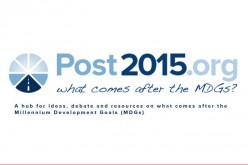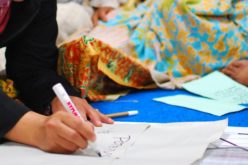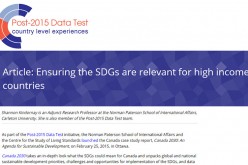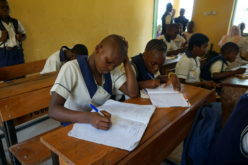Implementing Post-2015 Development Agenda: Bringing Country-Level Perspectives to United Nations
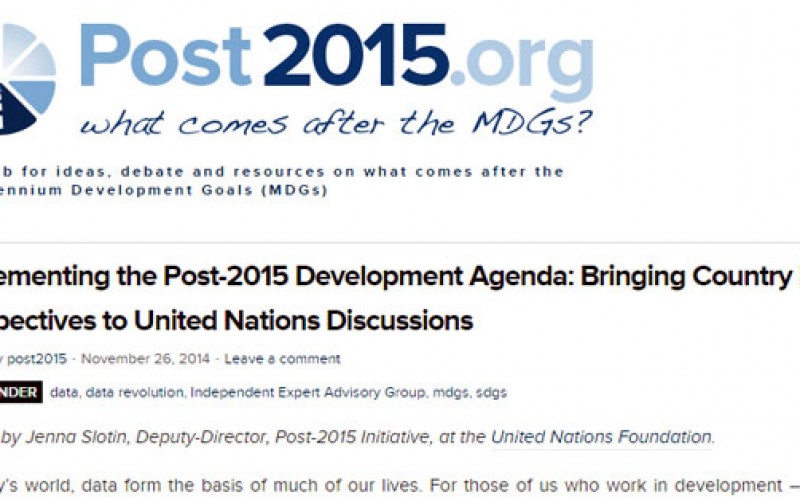
Written by Jenna Slotin, Deputy-Director, Post-2015 Initiative, at the United Nations Foundation, the post first appeared on post2015.org, administered by the ODI, on 26 November 2014.
In today’s world, data form the basis of much of our lives. For those of us who work in development – nothing rings truer. Reliable and accurate data allows us to make specific policy decisions, shows us where best to focus our interventions, and helps us to know if the actions we are taking are making a difference. For example, the Millennium Development Goals (MDGs) have been a cornerstone of development for the past 14 years. Since the adoption of the goals in 2000, countries have tracked progress on outcomes related to poverty, education, health, and more. Data have shown us what we have been able to achieve and what challenges remain. In just about 11 months, countries will adopt a new global development agenda, which will include a set of more ambitious global goals to replace the MDGs. Timely, reliable and accurate data will again be essential to defining policies to meet these new goals, setting baselines against which to monitor progress, and holding governments and other stakeholders accountable for their commitments.
As we prepare to scale up our efforts in 2016 and beyond, now is a critical stage to review what data will be required to inform implementation and to monitor progress. Having a clear understanding of the challenges and needs from the country perspective can help to ensure our global plan of action for the next development agenda is based on evidence and that we are setting a clear path for successful implementation. This is where the data revolution comes in.
In mid-October, the United Nations Foundation was pleased to join the Hewlett Foundation and a number of partners in the Post-2015 Data Test Initiative in discussions about data needs at the country level for the post-2015 development agenda. A team of researchers, the Post-2015 Data Test Team, led by the Centre for Policy Dialogue and the Normal Paterson School of International Affairs, in association with Southern Voice on Post-MDG International Development Goals, presented the initial findings of their research at a workshop that brought together civil society, academia, UN officials and member states. Presentations and discussion focused on the country level realities of implementing a global post-2015 framework. Research was conducted in Bangladesh, Canada, Peru, Tanzania, Turkey, Senegal, and Sierra Leone.
“Through examining a sample set of universal and country-level goals and targets for post-2015, we were able to map out what is feasible in our country,” said Dr. Mehmet Arda, researcher from Koc University in Turkey. ““For us in Turkey, a principal challenge is the need to use micro-data for filling some gaps that exist in published statistics.” Other important implementation challenges came through from the initial findings of the Post-2015 Data Test research, including the need for country flexibility to identify national priorities, coordination at all government levels, capacity constraints, as well as poor quality and limited availability, and accessibility of data.
“This kind of discussion and sharing of lessons learned across varied country contexts is an invaluable exercise,” said Sara Luna Camacho, a delegate from the Mexican mission to the United Nations in New York. “As we negotiate the elements of the post-2015 agenda, we need to be informed by the practical needs and challenges at the country level.”
The United Nations Foundation supports the development of an ambitious and feasible post-2015 agenda. A key aspect of our role in the process has been to amplify national voices and channel them into the negotiations and discussions taking place in New York. Presenting the initial findings of the Post-2015 Data Test research provided an important opportunity to highlight data challenges at the country level and discuss what needs to be done for effective monitoring and implementation of the new agenda.
So how does that data revolution link up with the post-2015 process? The first week of November, the United Nations Secretary – General’s Independent Advisory Group on data for sustainable development released its report, noting “without high-quality data providing the right information on the right things at the right time; designing, monitoring and evaluating effective policies becomes almost impossible.” Now that the report is published, we can work together to define the important next steps to ensure strong data availability, collection and use moving forward. But, the data revolution goes beyond thinking about how we will implement and measure the next development agenda. It helps us move to a pathway of stronger, more reliable data and systems – which are essential for long term policy-making, program implementation, and accountability.
1,611 total views, 2 views today




